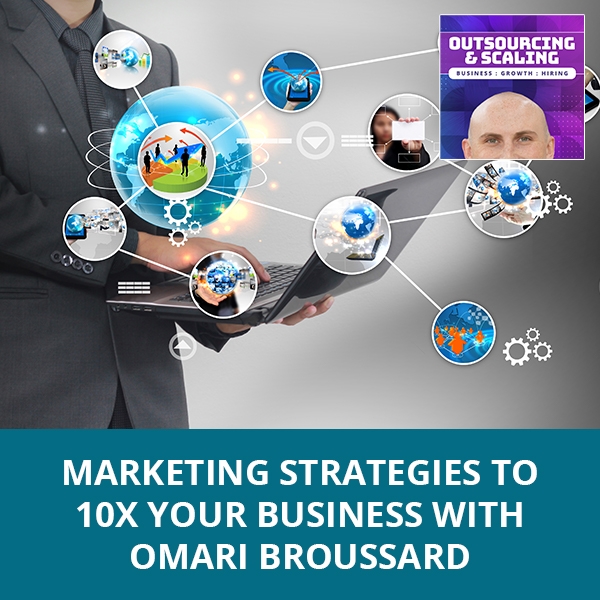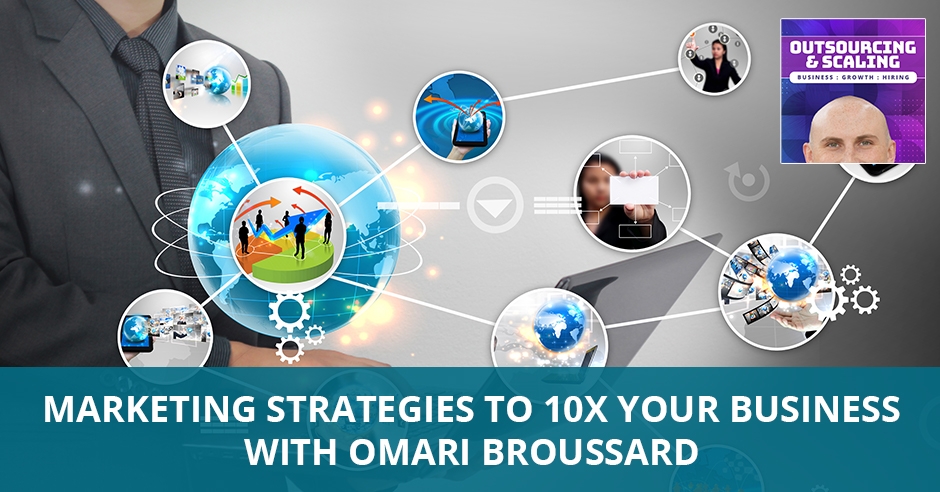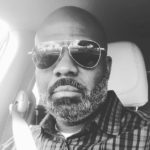


—
Listen to the podcast here:
[smart_track_player url=”https://www.podetize.com/statsapi/www.podetize.com/wp-content/uploads/fileuploads/11-5b145ef137b51b3d1af0633e9305c43d/07/2019/6d88d12832cd617a8dfe784749c21ca1.mp3″ title=”Marketing Strategies To 10X Your Business with Omari Broussard” artist=”Nathan Hirsch” image=”https://freeup.net/wp-content/uploads/2019/04/OAS.png” ]
Download the audio file here.
Marketing Strategies To 10X Your Business with Omari Broussard
I’ve got a special guest, Omari Broussard. Omari, how are you doing?
I’m good, Nathan. How are you?
I’m doing great. A little bit about you. You started your first business at the age of nine cutting grass for neighbors. At the age of seventeen, you joined the US Navy. We thank you for your service. He retired after 21.5 years of honorable service as Chief Petty Officer in 2015. His journey into marketing started back in 2012 when he started his defensive firearms training company, 10X Defense. His unique approach to marketing caught the attention of a number of small business owners, which spawned his consulting firm, 10X Strategies Consulting. Omari’s consulting firm helps business owners on leveraging online and offline marketing strategies and tactics to achieve their financial goals. He’s also co-founded two companies, DUDE Agency with Chris, and Leveraged Influence. Before we talk about all of that, why don’t we take out a gigantic step back. Talk to me a little bit of what you were like growing up. I know you started a business when you were nine. Were you also a straight-A student? Were you a rebel? Did you always know you wanted to be an entrepreneur?
I would have to say that I always knew I was going to be an entrepreneur. I was raised by a single mom, me and my little brother. I grew up in Southeast San Diego. I’m originally from San Diego. I was born in the mid-‘70s. I grew up in the ‘80s and ‘90s. In my neighborhood, you can imagine drugs and gang violence were heavy as I was growing up. It was pretty much its height. School wasn’t a thing unless you were going to be an athlete or you were going to be a scholar and I was neither. I knew by the age of thirteen, I was going to join the Navy but my plan was to go to the Navy and become a Navy SEAL, which I wasn’t able to do. My other plan was when it’s all said and done, I want to be an entrepreneur, ever since in the early days.
I want to ask you about that because in my mind, joining the Navy, the Army or the Air Force could not be further away from being an entrepreneur where you have that flexibility, the freedom and creativity. In the Navy, you’re following orders, following instructions and you’re a yes man, so to speak. Bridge the gap there. What’s going through your head thinking, “I want to be an entrepreneur but I want to put myself in that position too?”
It’s a crazy story because one of my best friends that I grew up with, he did a book report in the seventh grade which made me go, “I want to join the Navy.” He did a book report on a book called Men in Green Faces. It was one of the first books about Navy SEALs in Vietnam. I was like, “Whatever that is, I want to do that.” I’ve pretty much dedicated my life from the age of thirteen all the way until I joined at seventeen. I didn’t go to SEAL training until about five years in the Navy. At that time, I was going to get out since I wasn’t able to complete training due to medical issues, but I have another best friend who I grew up with since the third grade and he was a Navy SEAL. He was the one that told me to stay in.
Education has changed. There is enough self-education now available.
I’m in the complete opposite spectrum of being an entrepreneur. I did an interview with Business Insider and what I told them was, “I was conditioned for the adversity of business through my twenty years in the Navy.” What I had to learn in order to make that transition was get some specialized knowledge in the business world. The conditioning that I went through: systems, operations, management, leading, working when you don’t have a clock, not doing a regular 9 to 5 and being able to work three days straight with no sleep, that’s entrepreneurship. It was a great training ground. It took up every year of my adult life.
You have a lot of accomplishments too: Bachelor of Science in Organizational Security Management, Bachelor of Arts in Performance Psychology and MBA with a concentration on marketing. There are a lot of people out there that are saying, “Don’t get a college degree and focus on starting a business.” You’ve obviously done that plus the navy experience there. What would you tell those people?
My Bachelor of Science happened in the military because I was told very early on you can’t take anything away with you from the military other than education. What your experiences are and getting an education. I got my education while I was in. My Master’s in Performance Psychology I got after I retired. I did back to back Master’s programs. I did a Master’s in Performance Psychology because I had been teaching, coaching and training for years as a firearms instructor while I was in the Navy. I ran a CrossFit gym while I was in the Navy. I did a lot of entrepreneurial things while I was in the Navy. When you get out of the military, they give you the GI Bill, which gives you money to go get formal education. The only reason why I got two Master’s degrees was I promised my grandmother I would not waste that money. That was an obligation I made to my grandmother because I’m the first male in my family to have not just one college degree, let alone three. It was more of a personal thing.
What I would tell other people is education has changed. Now that I’ve gone through it, I have a different perspective because there are a lot of people that don’t go through it and then they give their opinion. Now that I have a Bachelor’s and two Master’s degrees, I can tell you beyond a shadow of a doubt that there is enough self-education available. When I went through my MBA with a concentration in marketing, I was near teaching the marketing class because I’ve been doing marketing for a couple of years in the real world with real businesses. It’s where you want to go. If you want to be a professor, if you want to be a researcher, if you want to be a doctor, you’ve got to go to college. If you want to be a business owner, you don’t necessarily have to but if you want to be a manager in a business, if you want to be a COO, if you want to be a VP of whatever, then a company might require academics.
What year did you get into marketing? How has it changed and evolved? How did you learn it and get off the ground?
Back when I started 10X Defense, which was my firearms training company that still runs over on the West Coast, it was 2011. I had been teaching off and on and doing some contracting outside the military for firearms training since 2007. Five years I was like, “I’m going to make my run out into the real world.” I went and my buddy was like, “You’ve got to learn marketing.” I went to a two-day event held by a guy named Lloyd Irvin. I call him my godfather of marketing because without him I wouldn’t even be here. I went to his two-day event but even though I got so much information about it, I still didn’t pay attention like I should have. I had a course scheduled in Nevada. I live in San Diego. It was a six-hour drive, dead of summer and 100 degrees. I got out there and the range was empty. Nobody showed up. It was at that moment that I realized not only do I need to do this marketing, I need to master it because if I can’t get people to show up, we’re done before we even start. I got involved in the local, what was used to be called GKIC, which is now No BS Inner Circle with Dan Kennedy. I wrote my first piece of copy after the first website that I built in 2012. Since then, I tell people, “Marketing is not my life. It’s my lifestyle. Every day it’s all I do.” It has been a huge shift for me not only professional life but my personal life as well as far as my trajectory.

Talk to me about your first business. What did year one look like? I feel like that’s where a lot of entrepreneurs achieve success or they fail because year one is hard. What was your starting point? How did you get it off the ground?
I did a podcast with my boys, Matt Wolfe and Joe Fier. I call it Start With Who You Know and that’s what I did. 10X Defense was my first business. I started teaching for free and I would do classes for free. The people that went to those classes, they would talk about it or I would get their testimonials and I would share the video that I took at the courses. Facebook at the time was a little bit more lenient on firearms training on the platform so I was able to do a couple of ads. I wrote a lot of blogs. I wrote for a personal defense network, which is an authority resource in the space. I did that grassroots.
My first marketing coach, Henry Evans, told me that marketing is blue-collar work. I got into the trenches. That first year is a grind but I’ve got to tell you, the second year and the third year, because of the work that I did in the first year and the patience that I had, the second and third year was a lot easier. By then, people started knowing my name. In fact, people that didn’t come to my courses or didn’t do business with me the first year, they did business with me the second year because a lot of people want to see if you as a business, you’re going to be around. That’s part of the equation. Can you last? I don’t want to buy something from you this year and then next year you disappear.
It was a grind but it was that foundation, the content that I wrote, the podcast interviews that I did and the videos that I shot. I even wrote for a buddy of mine and he’s a real estate agent. He did a newsletter. I would write home safety tips for his newsletter. Anywhere I can put out information and meet people and give value and then collect the success stories to let them tell my story versus me telling my story, that was key. The last thing is connections. I didn’t do it by myself. My mentor at the time was putting me on all the connections I made with other instructors across the country. We were collaborating and doing stuff together. I would say that strategic partnerships and alliances are the other key, which I’m learning more and more so than ever.
Talk to me about your first hire because I know that’s an experience for everyone. Who was it? How did it go?
I hired a VA out of the Philippines. It went well as far as we were able to get some things done but I did not understand the hiring process and what I needed to do. Getting somebody to raise their hand and work for you is great but if you don’t have systems, documentations and processes in place for them to execute on, there’s always going to be this struggle. You’re always going to be looking at it like, “I wish they would do this.” That’s your fault. You as the business owner, the buck stops with you. If you don’t have the systems and processes in place to facilitate their work, you’re done and you’re going to be frustrated. My companies, we have bigger teams but it was a hard lesson. That first hire, getting somebody was relatively easy, “Here’s what I want done.” You always run into, “Do I have enough work?” That was a big thing for me but if I would’ve had systems and processes in place, that would have been a non-issue. I would have been like, “Do this checklist every day.” I can forecast out what the work’s going to be based off what’s required to accomplish and the process.
The thing about A players is they are A players for a reason. They’re probably already thinking of being on their own.
What do you look for when you’re hiring people? You’ve obviously hired a lot of people. Like me, I’ve learned from the bad hires. I do want to hear your horror story next but before we jump into that, what do you look for? Let’s say you’re looking at building a team. What traits do you look?
We’re in that process and we’re different. I took some of my military background and brought it in, which I tend to do a lot since that’s most of my life. I like the apprentice model. I’ll look for somebody, they’re young, hungry and have a talent. I’m like, “Come on board with me as an intern for 90 days,” and within that 90-day period, I’m going to find out if they’re going to be worth paying or not. Through that 90 days, it’s not, “Go get my coffee,” I’m putting them through training. She works out of Chris’s office. I brought her on because I needed somebody to help manage my chaos from an operational strategic standpoint.
I knew she had experience in managing and creating systems and stuff, but she had no idea about marketing. For 90 days I trained her and all the big-picture things. I’m a digital marketer and certified partner. I gave her all the relevant certifications. She went through their training and did practicals and then she watched me build a couple of marketing funnels from end-to-end. She was involved in the project management of that. The last couple of weeks, I was giving her more challenging items to do to see how she would respond. Before the 90th day, I already knew I was going to pay her.
Do you feel like that limits you at all? You’re hiring people that you can teach. Do you ever hire people that are more high level, that are maybe bringing skills to the table that you don’t have or are you much more of, “I have a system, I have a process and I need to hire people that can follow it?”
I’m a big Jay Abraham fan and I read one of his articles that says, “Two ways you can build a team. You can train them from the ground up or you can hire A players.” A lot of it’s going to depend on where your business is. At this stage, with Leveraged Influence and the consulting company, I’ve learned a lot of lessons. I find myself partnering with experts. One of my best friends runs an eCommerce store. He contacted me and he was like, “I need a rebrand. I’ve got to rebuild this thing.” I looked at the scope of work. I tapped into my network and said, “Who’s the eCommerce?” One of my partners, Jeff Ross out of Australia, he was like, “I got you. I’ve got the eCommerce thing. That’s what we do.” I partnered up with Jeff, done deal. I’m running a more of a hybrid model and I like partnerships with experts because the company that we’re running is not at that point yet to where we can bring on an A player and hire them top dollar.
I find that I get a little bit more leeway as I partner with experts and then the people that I bring on and train because we’re getting better at creating systems, we’re compressing that apprenticeship time. What was 90 days may end up only being 30 as we build this out. With technology and the way things are, in my experience, there’s no one formula. It’s you take from different formulas and then come up with your own. As you level up, once we break the seven to eight-figure mark, it’s going to change. What we start with now is not what we’re going to end up with. I’m not against hiring A players but in my experience, I’ve been partnering with A players. The thing about A players is they are A players for a reason. From my experience, because of the way things are, they’re probably already thinking of being on their own.

Do you have a horror story? Any hiring story that went terribly wrong that you can share with the audience and what you learned from it?
Horror story is relative but for me at this point, it was a couple of years back. I wanted an executive assistant. It’s not the one that I have but it was one that I had before. I had put all this time into onboarding, “Here’s what we’re going to do,” and I’m thinking, “My calendar’s going to ease up. I’m going to be able to focus,” and that person went dark, no response, nothing. I’m like, “I put three weeks into getting everything settled and there’s nothing there.” I went through all this process and I’m by myself again. That’s my biggest one. That’s what led me into testing people out or extending the hiring process so when I do hire, they’re going to be there.
We’ve all had someone disappeared. I hired a developer back in the day and we had planned out this entire project. Day one, we were supposed to start and he disappeared and I never heard from him again.
That was my big question, “What went wrong? What did I do?”
I had a Facebook post, something along the lines of, “If you could think of your worst hire and you could ask one question and get an answer, what would it be?” That would be my question. There’s like, “What happened?” Talk to me a little bit more about where you’re at, what you’re working on and tell the audience how they can hear more about you.
My partner, Chris Martinez, DUDE Agency, which is an outsourcing agency for digital marketing agencies. I’m involved in that. Leveraged Influence is new. We started it, me and my partner, Andrew O’Brien. He was in the PR space. We came up with a business that takes the heavy lifting out of PR, which is the research and the pitching. We have a service where our team will do the research for the media outlets and we will do the pitch and make the connection. Once the connection’s made, we connect the media outlet with the business owner and we let them take it from there. We started that from me and Andrew and we have a team of six or seven. I’m working on that. My consulting firm, I’m about to change the name but I’m heavy into marketing consulting from a strategic level. There are so many marketing tactics you could do but if they don’t fit within one clear framework, you’re going to bury yourself in the chaos of MarTech and tactics. That’s what I’m working on. I’m speaking more and I’ll be on the road more, getting my mentor advisory board down and connecting with other people. That’s going to be very huge for every business to have connections across the globe to get things done. People can find me on Facebook. I have my public profile, Omari Broussard. You can always reach out to me there through Messenger. I’m down to help if people have questions.
Omari, thank you so much for coming on. This was awesome.
I appreciate you, Nathan. Thank you.
Important Links:
- 10X Defense
- DUDE Agency
- Leveraged Influence
- Men in Green Faces
- Podcast – Omari’s episode
- Omari Broussard – Facebook
About Omari Broussard
 Omari Broussard started his first business at the age of 9 cutting grass for neighbors. At the age of 17, he joined the U.S. Navy. He retired after 21.5 years of honorable service as a Chief Petty Officer in 2015. His journey in Marketing started in 2012 when he started his defensive firearms training company, 10X Defense. His unique approach to marketing caught the attention of a number of small business owners, which spawned his consulting firm, 10X Strategies Consulting.
Omari Broussard started his first business at the age of 9 cutting grass for neighbors. At the age of 17, he joined the U.S. Navy. He retired after 21.5 years of honorable service as a Chief Petty Officer in 2015. His journey in Marketing started in 2012 when he started his defensive firearms training company, 10X Defense. His unique approach to marketing caught the attention of a number of small business owners, which spawned his consulting firm, 10X Strategies Consulting.
Omari’s consulting firm helps business owners leverage online and offline marketing strategies and tactics to achieve their financial goals. He has also co-founded two companies: DUDE Agency and Leveraged Influence. Omari is also a published author, investor, speaker and advocate for veteran entrepreneurship. His academic accomplishments include Bachelor’s of Science in Organizational Security Management, Masters of Arts in Performance Psychology, and MBA with a concentration in Marketing.
